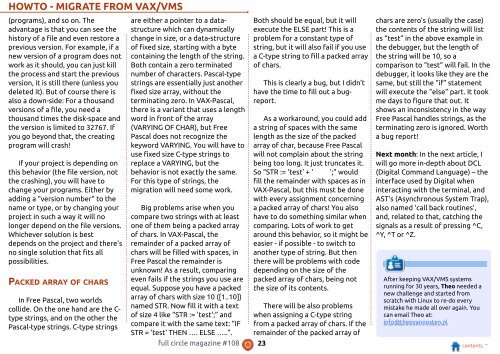You also want an ePaper? Increase the reach of your titles
YUMPU automatically turns print PDFs into web optimized ePapers that Google loves.
HOWTO - MIGRATE FROM VAX/VMS<br />
(programs), and so on. The<br />
advantage is that you can see the<br />
history of a file and even restore a<br />
previous version. For example, if a<br />
new version of a program does not<br />
work as it should, you can just kill<br />
the process and start the previous<br />
version, it is still there (unless you<br />
deleted it). But of course there is<br />
also a down-side: For a thousand<br />
versions of a file, you need a<br />
thousand times the disk-space and<br />
the version is limited to 32767. If<br />
you go beyond that, the creating<br />
program will crash!<br />
If your project is depending on<br />
this behavior (the file version, not<br />
the crashing), you will have to<br />
change your programs. Either by<br />
adding a “version number” to the<br />
name or type, or by changing your<br />
project in such a way it will no<br />
longer depend on the file versions.<br />
Whichever solution is best<br />
depends on the project and there's<br />
no single solution that fits all<br />
possibilities.<br />
PACKED ARRAY OF CHARS<br />
In Free Pascal, two worlds<br />
collide. On the one hand are the C-<br />
type strings, and on the other the<br />
Pascal-type strings. C-type strings<br />
are either a pointer to a datastructure<br />
which can dynamically<br />
change in size, or a data-structure<br />
of fixed size, starting with a byte<br />
containing the length of the string.<br />
Both contain a zero terminated<br />
number of characters. Pascal-type<br />
strings are essentially just another<br />
fixed size array, without the<br />
terminating zero. In VAX-Pascal,<br />
there is a variant that uses a length<br />
word in front of the array<br />
(VARYING OF CHAR), but Free<br />
Pascal does not recognize the<br />
keyword VARYING. You will have to<br />
use fixed size C-type strings to<br />
replace a VARYING, but the<br />
behavior is not exactly the same.<br />
For this type of strings, the<br />
migration will need some work.<br />
Big problems arise when you<br />
compare two strings with at least<br />
one of them being a packed array<br />
of chars. In VAX-Pascal, the<br />
remainder of a packed array of<br />
chars will be filled with spaces, in<br />
Free Pascal the remainder is<br />
unknown! As a result, comparing<br />
even fails if the strings you use are<br />
equal. Suppose you have a packed<br />
array of chars with size 1 0 ([1 ..1 0])<br />
named STR. Now fill it with a text<br />
of size 4 like “STR := 'test';” and<br />
compare it with the same text: “IF<br />
STR = 'test' THEN …. ELSE …..”.<br />
Both should be equal, but it will<br />
execute the ELSE part! This is a<br />
problem for a constant type of<br />
string, but it will also fail if you use<br />
a C-type string to fill a packed array<br />
of chars.<br />
This is clearly a bug, but I didn't<br />
have the time to fill out a bugreport.<br />
As a workaround, you could add<br />
a string of spaces with the same<br />
length as the size of the packed<br />
array of char, because Free Pascal<br />
will not complain about the string<br />
being too long. It just truncates it.<br />
So “STR := 'test' + ' ';” would<br />
fill the remainder with spaces as in<br />
VAX-Pascal, but this must be done<br />
with every assignment concerning<br />
a packed array of chars! You also<br />
have to do something similar when<br />
comparing. Lots of work to get<br />
around this behavior, so it might be<br />
easier - if possible - to switch to<br />
another type of string. But then<br />
there will be problems with code<br />
depending on the size of the<br />
packed array of chars, being not<br />
the size of its contents.<br />
There will be also problems<br />
when assigning a C-type string<br />
from a packed array of chars. If the<br />
remainder of the packed array of<br />
chars are zero's (usually the case)<br />
the contents of the string will list<br />
as “test” in the above example in<br />
the debugger, but the length of<br />
the string will be 1 0, so a<br />
comparison to “test” will fail. In the<br />
debugger, it looks like they are the<br />
same, but still the “if” statement<br />
will execute the “else” part. It took<br />
me days to figure that out. It<br />
shows an inconsistency in the way<br />
Free Pascal handles strings, as the<br />
terminating zero is ignored. Worth<br />
a bug report!<br />
Next month: In the next article, I<br />
will go more in-depth about DCL<br />
(Digital Command Language) – the<br />
interface used by Digital when<br />
interacting with the terminal, and<br />
AST's (Asynchronous System Trap),<br />
also named ‘call back routines’,<br />
and, related to that, catching the<br />
signals as a result of pressing ^C,<br />
^Y, ^T or ^Z.<br />
After keeping VAX/VMS systems<br />
running for 30 years, Theo needed a<br />
new challenge and started from<br />
scratch with Linux to re-do every<br />
mistake he made all over again. You<br />
can email Theo at:<br />
info@theovanoosten.nl<br />
full circle magazine #1 08 23 contents ^




